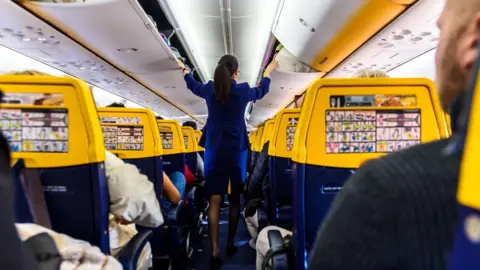Ryanair, the Irish budget airline known for its controversial business practices, has recently informed several of its flight attendants based in Spain that they must repay substantial salary increases that had been granted to them. The amount these attendants are required to repay could reach as high as €3,000 (approximately £2,525). This unexpected turn of events comes as a result of a legal dispute involving the airline and the Spanish trade union, USO (Unión Sindical Obrera). The matter has caused significant upheaval among the flight attendants who are now facing financial uncertainty.
The chain of events began when Ryanair communicated with the USO, indicating that the company would soon disclose to its members the exact amounts owed in light of a favorable court ruling. This court decision effectively nullified a pay agreement that Ryanair had previously settled with a different union—CCOO (Comisiones Obreras). Although the salary increase had been agreed upon with CCOO, it had applied to all flight attendants across the airline. This implies that due to the court’s nullification, the pay increases are now considered invalid, leaving the airline to reclaim the funds.
Ryanair’s internal messaging underscored that the USO’s members were raising objections over the reduction in their pay, which is consequential since their union has initiated legal action against the company. The airline took a firm stance, declaring, “USO are complaining about pay cuts that result from their court case,” adding that Ryanair is adhering strictly to the legal findings related to the suit, while noting that the case is currently under appeal.
The USO union has responded to this situation by informing the BBC that they are diligently seeking the most appropriate legal avenues to address the issue of salary repayments. They revealed that the salary increases that Ryanair is seeking to recover ranged from €1,500 to €3,000 and were disbursed to flight attendants between October of the previous year and March. It was during March that the Spanish court ruled on the validity of the original pay arrangement, setting this current situation into motion.
Notably, a Ryanair spokesperson has refrained from disclosing specific details regarding the number of flight attendants impacted by this repayment demand or the potential consequences for those who refuse to return the funds. However, the USO stated that the airline has informed the affected flight attendants that the repayment amounts would be deducted directly from their upcoming paychecks until the owed sums have been completely settled.
In a further communication, the USO asserted that while some non-USO affiliated employees are not obligated to repay the increases, all delegates of their union have been specifically requested to return the funds. Ryanair characterized the union’s actions in maintaining the terms of the original agreement as “farcical,” signaling a growing rift in communication and cooperation between the airline and its employees.
Despite Ryanair’s assertions, the USO maintains that those who negotiated the initial salary deal with CCOO lacked the legal authority to finalize such an agreement, leading to their departure from the negotiations. They emphasized that the discussions were irregular and that this lack of authority invalidates the agreement, further reinforcing their position against the repayment requests. Consequently, members as well as non-members have reportedly seen their salaries reverted to their pre-agreement levels.
This unfolding situation not only intensifies the existing friction between Ryanair and its workforce but also highlights the broader complexities of labor relations within the airline industry. As the legal implications continue to develop, both Ryanair and the USO face scrutiny from their respective stakeholders, including flight attendants, legal experts, and the public. The outcome of this dispute could have lasting effects on labor negotiations and policies within the aviation sector in the future.



